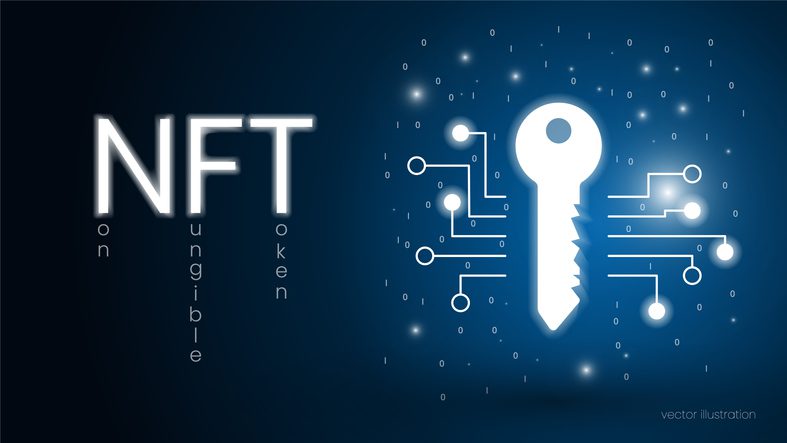[Editor’s Note: This is an article by Devin Partida, the Editor-in-Chief of ReHack.com. Devin is a Fintech and crypto writer whose work has been featured on industry publications such as FinTech News, Due, the Swissborg blog and FinTech Insight.]
Non-fungible tokens (NFTs) are units of data associated with unique digital files, most commonly cryptographic assets on a blockchain. These files can be anything, but they’re often pieces of art, music or recordings of live performances.
These NFTs are traded on what are effectively online digital art markets, with records of ownership, bidding, and transfers stored on the blockchain. Blockchain is the digital ledger technology that supports cryptocurrencies, smart contracts, and other cutting-edge applications.
What has made these NFTs notable recently is the high values that some early tokens have sold for. In March, a digital trading card of Tom Brady sold for more than $1.3 million in Ethereum. Famous auction house Christie’s sold an NFT of a digital painting for more than $69.3 million.
Unlike tokens and coins, which are fungible, NFTs can’t be exchanged for one another. They all have their own values and code that makes them unique from each other and identifiable.
These NFTs have already had a major impact on the crypto space. Soon, they’re likely to have an impact on fintech (financial technology), both inside and outside crypto. But the transformative potential of the tech may be overshadowed by concerns about the security of crypto assets, and the impact that NFTs may have on the environment.
NFTs May Drive DeFi Innovations
NFTs may be central to the future of decentralized finance (DeFi). These are fintech projects that use cryptocurrency or the blockchain to disrupt existing financial intermediaries.
For example, Teller Finance, the developer of an algorithmic credit risk protocol, has started using collectible NFTs to generate initial liquidity for the protocol. Holders of these Teller NFTs also gain access to some “immediate APY benefits” as well as a number of longer-term benefits that the company plans to announce soon.
For fintech companies that want to invest in the crypto space or launch DeFi services of their own, NFTs may provide an alternative to other crypto fundraising techniques, like coin IPOs.
Other new NFT-related DeFi projects show how fintech may evolve as the crypto space continues to grow and attract new investors.
For example, in the same way that blockchain stocks and funds have emerged in response to the growing value of the crypto space, we’re also seeing an emergence of NFT-related funds.
One early example is NFTX, a community-owned protocol for the creation and trading of NFT index funds.
The Drawbacks and Risks of NFTs
Every NFT is unique and non-fungible, and its ownership is stored on the blockchain. The blockchain is, by its nature, very hard to edit — while new entries can be added, old ones are almost impossible to change.
This should mean that ownership is very easy to track and that crypto assets like NFTs should be even safer than traditional assets.
NFTs have an owner, but ownership isn’t measured with something like an ID. Instead, ownership is attached to two pieces of code: your private and public keys, both associated with an Ethereum “wallet.” Lose control of this wallet due to a hack, and your NFTs are no longer yours.
This has already happened. In early March, users of the NFT marketplace, Nifty Gateway, began reporting thefts of NFT art after an unknown number of accounts were compromised by hackers. One user reported losing up to $10,000 after hackers used his account to buy and sell NFTs.
These security risks are somewhat inherent to the way the blockchain works — and are why some crypto investors have turned to highly secure solutions like hardware wallets or digital wallets that require multiple forms of authentication.
There’s also the problem of the blockchain’s energy consumption.
By design, blockchain requires a significant number of calculations for each new piece of information added — and energy consumption, as a result. Estimates on how much of an impact NFTs are having vary, but we know that the cryptocurrency ecosystem — including mining and blockchain verification — consumes more energy than the country of Argentina.
Some NFT traders, in a bid to reduce the impact of NFT trading, have committed to investing in “carbon offsets.” These are projects that aim to decrease carbon emissions by, for example, planting new trees or protecting vulnerable acres of rainforest in the Amazon.
Whether these projects will be enough to offset the carbon produced by NFT trading is yet to be seen.
Fortunately, NFTs may become a lot less power-hungry in the near future. Right now, NFTs run on Ethereum 1.0. Soon, the company behind Ethereum plans to release and integrate Ethereum 2.0. The new version’s blockchain will use a more energy-efficient proof-of-stake system, rather than the current version’s proof-of-work system.
How NFTs Are Likely to Change FinTech
NFTs are likely to continue making headlines into the near future. There’s a significant amount of money already invested in these tokens, and it seems the market is likely to grow significantly in the coming months.
The rise of NFTs may have major implications for fintech. The combination of NFTs and DeFi is where the innovation for fintech will come, at least in the near term.
New DeFi services, for example, are using NFTs to generate liquidity. Some DeFi startups and community projects are offering new services based on NFT trading. As more digital assets become NFTs this could create entire new asset classes which could change the way consumers invest.
While there remain concerns around the security and environmental impact of NFTs, these tokens are on track to increase the impact that the crypto space is having on the financial sector and fintech.
For a deeper dive into NFTs and DeFi check out this recent podcast with Lex Sokolin of ConsenSys.



